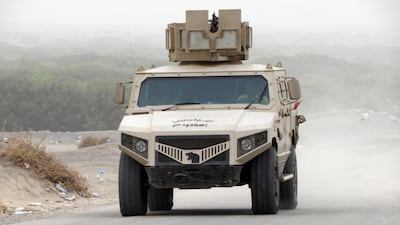The United States is providing the Saudi-led coalition in Yemen with logistical support as it wages an offensive to retake Hodeidah but is not involved in combat operations, the Pentagon said on Thursday.
"The United States is not involved in offensive operations in Hodeidah," Pentagon spokesman Major Adrian Galloway said, outlining the scope and role of Washington's mission in Yemen including the battle for the port city launched on Wednesday.
“Our support to the coalition consists of aerial refuelling to coalition aircraft and intelligence support to assist our partners in securing their borders from cross-border attacks from the Houthis," Maj Galloway said.
While the Pentagon viewed the conflict in Yemen as one that “affects regional security across the Middle East and threatens US national security interests, including the free flow of commerce in the Red Sea", the US “does not command, accompany, or participate in counter-Houthi operations or any hostilities other than those authorised against Al Qaeda in the Arabian Peninsula and ISIS," he said.
Instead, "our non-combat support focuses on improving coalition processes and procedures, especially regarding compliance with the law of armed conflict and best practices for reducing the risk of civilian casualties".
____________
Read more:
Who are the Yemeni ground forces fighting in Hodeidah?
Coalition attacks Houthi positions in Hodeidah
Yemen latest: offensive for the liberation of Hodeidah enters second day — live updates
____________
While recognising the crucial function of Hodeidah port in providing aid, the statement added that "US military support to our partners is always geared towards mitigating noncombatant casualties".
Nicholas Heras, a defence fellow at the Centre for New American Security, said the US "is in an awkward position in Yemen".
On the one hand, "the UAE has carved out a zone in southern Yemen that is both free of Iranian-backed militias and allows the US to go after Al Qaeda and ISIS, and the US is taking advantage of the UAE's hard work in southern Yemen to conduct more strikes against terrorist groups," Mr Heras told The National.
On the other hand, “the war against the Houthis in northern Yemen has resulted in Saudi Arabia's borders being regularly breached, missiles being fired at Saudi cities, international shipping being threatened, and a humanitarian crisis,” he said.
“Iran is seemingly embedded in the mountains of Yemen, messing with Saudi Arabia at will.”
In that sense, the war against the Houthis in northern Yemen "is placing demands on the United States to do more, and to do it quickly".
The US “no longer has a choice but to escalate because the alternative is that the coalition suffers heavier casualties and the Houthis keep firing into Saudi Arabia with missiles coming through Hodeidah,” Mr Heras said.
“Hodeidah is just the beginning, and in some ways the easier battle in what needs to be a larger campaign on Sanaa", the rebel-held capital, he said.
A US National Security Council spokesperson told The National that "the United States continues assisting Saudi Arabia and the United Arab Emirates in meeting their commitments to abide by the Law of Armed Conflict and avoid to the greatest extent possible the risk of civilian causalities during military operations."
The official added: “We expect all parties to honour their commitments to work with the UN Special Envoy and support a political process to resolve this conflict, ensure humanitarian access, and map a stable political future for Yemen.”

